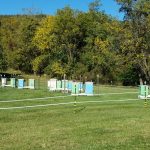Magnolia Farm & Apiary
Better bees, better honey®
Thank you for visiting Magnolia Farm & Apiary!
Our mission is simple: To provide only the best products and services. We pride ourselves in providing the highest quality products and personalized customer service, along with a customer-friendly experience that will keep our customers coming back. Our bees are our passion. “Their” honey is generally available during the summer and fall months (June-September). Local honey is quite popular. Thus, the demand is always greater than the availability. We participate in several local farmers markets and fairs. This information is posted on this site (Click on the “View Our Products and Services” tab below). Contact us and we’ll arrange a scheduled pickup or delivery.
In addition to honey, we offer services such honeybee swarm capture. We also produce high quality orchard grass hay. In the future, we will expand our operations to include nucleus colonies (“nucs”).
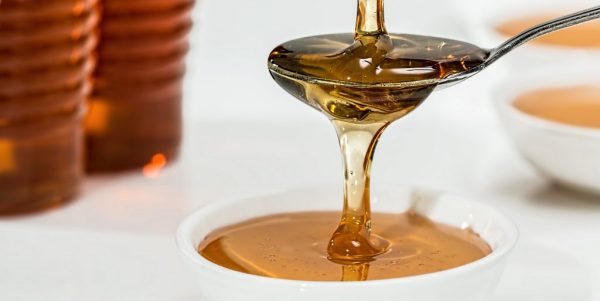
Desi Crouther
founder
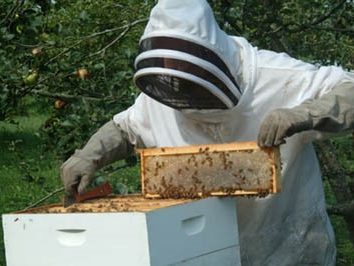
In 2014, I commenced laying the foundation for my long sought desire to become a beekeeper. As a senior executive for a large Federal department in Washington, DC, my decision to leave the workforce and become a beekeeper caught a number of individuals off guard. Nevertheless, with a talent for innovative and creative thinking; a natural eye towards business matters; and a desire to succeed, I moved forward and have not looked back with any regrets.
Beekeeping is truly a journey and not a destination. Becoming a successful beekeeper requires extreme determination, a humbling perspective, and the patience of Job. A fabulous sense of humor is an asset too (as you’ll find yourself laughing at some of the things you do or some of the advice you receive). Unlike other professions, the odds of you becoming a “know-it-all” are remote at best. One size never fits all. And you are never in control – despite your best efforts. Sometimes the bees will let you think you’re the boss or have figured “it” out. But in a tiny moment, they’ll show you otherwise. Yet, this journey is filled with exceptional moments. And it’s the exceptional – not the ordinary – that I find truly fulfilling.
“Beekeeping is truly a journey and not a destination.”
My Beekeeping Adventure
the first SEveN Seasons – a QUICK SUMMARY
Seasons 1-3: My beekeeping journey officially started on February 14, 2015 – yes, Valentine’s Day. This is the day I completed my first beekeeping course via the Loudoun Beekeepers Association. I highly recommend anyone considering or simply interested in beekeeping take an introductory beekeeping course. These courses typically provide critical insights for topics such as: honey bee biology and lifecycle; beekeeping equipment; bee health challenges; bee products; installing bee packages and nucleus colonies; and much more. A field session or day, including installing packages and nucleus colonies of honey bees, is typically included. At the conclusion of my course, I was given a mentor to guide me though my first year. He was and still is a valuable asset.
I struggled in my efforts to find the perfect sunny spot for my hives. The area selected was neither sheltered from the strong winds nor inside a fenced area. Nevertheless, on April 23, 2015, I installed three packages of bees. Two of the packages subsequently merged (not sure how or why). But with the assistance of my mentor, I successfully split the combined hives and purchased my first replacement queen.
All three hives made it through their first winter due in great part to adequate food supplies; wind breaks; and moisture abatement. I added three additional packages on April 11, 2016. This is also the day at least two of my first-year hives swarmed. Sadly, I failed to catch either of these swarms. On April 23, 2016, I caught my first swarm – a grapefruit size collection of bees that I thought wouldn’t make it. However, they are now one of my most productive hives. On May 11, 2016, I installed my first “nuc”. I lost one of my original hives due to a “laying worker” issue a few weeks later.
I carried seven hives into the 2016 winter, and each made it through winter. To keep the hives from swarming, I eventually made five splits, resulting in 12 hives in the late spring of 2017. Despite these challenges, we produced a significant quantity of honey.
Season 4 (2018) was a challenge to say the least. I carried nine hives into the 2017 winter, and six hives made it through winter. This was the first winter I suffered losses. However, I was fortune as average losses were nearly 60% for the State of Virginia. I made four splits and added four packages (new hives), resulting in 14 hives in spring. We experienced a wetter than normal spring, summer and fall, resulting in a reduction (30%) of my projected honey yield. We commenced sale of our honey in 2018 at the Community Foodworks’ (CF), Oakton Farmers Market. We thoroughly enjoyed this experience and thank all of our customers for their support and feedback on our honey. My hives swarmed later than normal (August and September), weakening the mother hives at a critical time. I suffered a subsequent round of hive losses, and carried only 10 hives and 2 nucs into winter. It will truly be a miracle if the 2 nucs make it, given the size of their bee populations. And one of my hives is queenless. It too will require a miracle. I’m hopefully for a better 2019 and planning an expansion of my beekeeping activities. Lastly, we plan to participate in one or more farmers’ markets in 2019.
Season 5 (2019) started on a sour note. Only five hives of my hives survived the winter, emerging in the spring in a weaken state. My winter losses were greater than 50%. I purchased two nucs – each with a Minnesota Hygienic Italian queen. These bees are bred to have a high degree of hygienic behavior known to be effective against certain diseases of the brood. This trait allows hygienic bees to naturally combat some of the major problems facing bees and beekeepers. I also made five splits. Despite fewer hives than some earlier years, we greatly exceeded our projected honey yield. We sold honey in two CF Markets – Chantilly and Reston. We thoroughly enjoyed this experience and thank all of our customers for their support and feedback on our honey. Twelve hives went into winter 2019/2020. I’m hopefully for a better 2020 and plan to expand my beekeeping activities.
Season 6 (2020) was a huge challenge for us – like most Americans. We suffered few hive loses but experienced some weather-related challenges that impacted out honey production. Despite these challenges, we participated in the 2020 FRESHFARM Reston Farmers Market. We also started a second bee yard (in Round Hill), a few miles away from our main yard. Despite a milder than normal 2020 winter, we lost a number of hives. Surviving hives tended to be light (small bee clusters). This will impact our 2021 honey production. We are committed to selling our honey exclusively at the FRESHFARM Reston Farmers Market: https://www.freshfarm.org/markets/reston . See you there!
Season 7 (2021) was a huge success beekeeping. But like most Americans, we continued to suffer the affects of COVID-19. We experienced very few hive loses and but experienced shortages with regard to honey jars and some beekeeping-related items. The weather facilitated honey production – our most productive year ever! We participated in the 2021 FRESHFARM Reston Farmers Market on a weekly basis. Additionally, we made our inaugural appearance at the FRESHFARM Springfield Farmers Market in September. Milder than normal temperatures occurred in November and December 2021. These conditions; a proactive hive management protocol (including good nutrition); maintaining health queens; and attentiveness to mite control should result in few hive losses over the winter. A couple hives are likely not queen right. I elected to not intervene. Therefore, the odds of them surviving are ‘slim’. We are committed to selling our 2022 honey at the FRESHFARM Reston Farmers Market: https://www.freshfarm.org/markets/reston probably starting in mid-June 2022. Updates will be posted here. See you there!
Season 8 (2022) started off great. All but one hive made it through the winter. Honey production was in line with expectation. In addition to maintaining hives in Round Hill, I started an apiary at Frying Pan Farm Park: https://www.fairfaxcounty.gov/parks/frying-pan-park/. We participated in the 2022 FRESHFARM Reston Farmers Market on a weekly basis. Additionally, we made our ‘pop up’ appearances at the FRESHFARM Springfield Farmers Market in September. Unfortunately, I had numerous queen failures following my splits, resulting in a number of laying worker and drone-laying queen situations. This resulted in me going into winter with 60% of the hives I had planned to have. Mites were a greater than expected issues and contributed to a number of losses. With the closure of the Springfield Farmers Market, I need to find an additional 2023 market. But we are committed to participating in the Reston Farmers Market. See you there!
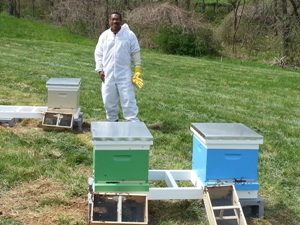
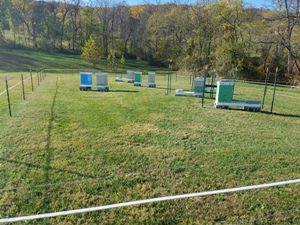
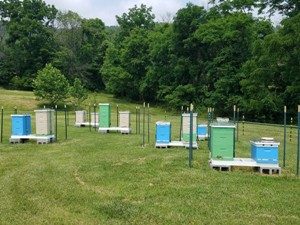
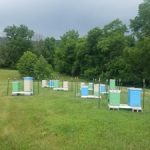
July 2018
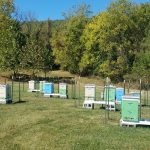
December 2019
